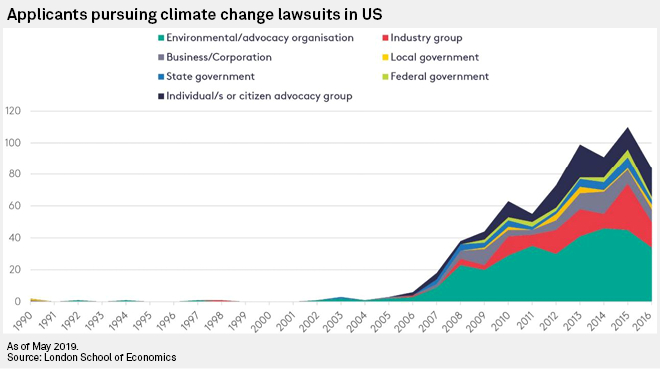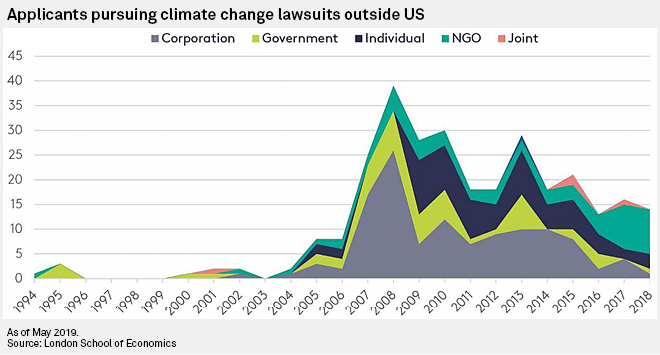At least 28 countries have seen lawsuits relating to climate change action as campaigners and investors try to force states to step up their battle against global warming and put pressure on big corporate greenhouse gas emitters, new research shows.
Climate-related litigation continued to expand across the globe over the past year, including in Europe, although more than three-quarters of the more than 1,300 cases recorded since 1990 have been filed in the United States, according to an analysis by researchers at the London School of Economics and Political Science, or LSE.
They found that, in addition to pressing governments to strengthen climate action, litigants are increasingly starting to target the highest greenhouse gas-emitting companies, both to change corporate behavior and seek compensation for losses and damages. Investors, activist shareholders and regional authorities are also starting to take to the courts.
"Holding government and businesses to account for failing to combat climate change has become a global phenomenon," said Joana Setzer, a research fellow at LSE's Grantham Research Institute on Climate Change and the Environment and a co-author of the report.

Non-governmental organizations, in particular, have filed more lawsuits in recent years and are increasingly trying to establish a link between climate impacts and human rights — an argument that has resonated with judges despite difficulties in drawing a direct link between emissions and specific effects of global warming, according to Setzer.
The Urgenda Foundation, an environmental group, last year won a landmark case to force the Dutch government to increase its 2020 target for cutting carbon emissions. Although the state is fighting the ruling in the country's highest court, it has already had to speed up planned coal power plant closures to comply with the ruling.
The researchers also identified a wave of state and city lawsuits against fossil fuel companies in the U.S. since 2015, which allege that
More and more investors and shareholders around the world are also pressuring corporations and investment funds to disclose and incorporate climate risk and implement adaptation measures.
"Until recently businesses might not have considered a climate change lawsuit to be a risk, but this is something all corporations should now be taking into account," Setzer said.

The overwhelming number of climate cases is still fought in the U.S., where the researchers identified 1,023 as of May 2019. That compares to 94 in Australia, 53 in the U.K. and 55 at European Union level, for example. The numbers include both strategic cases that aim to influence climate accountability and routine cases, for example on planning applications, which may end up having similar impacts.
In one of the most high-profile cases, two environmental groups and 21 children sued the federal government in 2015 over its response to climate change. More recently, 154 cases were filed during the first two years of the Trump administration, which has sought to roll back environmental protections.
Those efforts include a proposal to freeze vehicle emissions standards, a planned suspension of methane pollution rules for the oil and gas industry and finalized new rules to replace the Obama-era Clean Power Plan to rein in emissions from the power sector, which the agency's own calculations show to be inadequate.
But the LSE analysis found that, of the 41 cases that have been decided so far, only three sided with the government's deregulation efforts. More than 20 suits have been filed specifically to defend the federal climate policies of the Obama administration and the researchers found those were overwhelmingly successful.
"To date, more than two-and-a-half years into the Trump administration, no rollback of a climate regulation brought before the courts has survived a legal challenge," they wrote.

However, of all the lawsuits decided in the U.S. before 2016, more have resulted in rulings that hindered climate change efforts than enhanced them. Outside the U.S., the picture is reversed, with significantly more rulings in favor of stronger climate efforts.
"It remains an expensive and potentially risky option ... if compared to other routes like policy-making," Setzer said.



